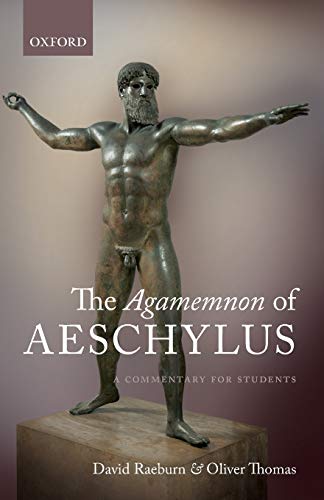

Full description not available
S**Y
Excellent scholarly commentary
I had a year of Greek some decades ago at UCLA. That gave me a good foundation to embark on reading during the time since. I worked through the Agamemnon with the aid of David Raeburn's and Oliver Thomas' Commentary, as well as the text used by the Perseus Digital Library where you can click on an unusual Greek word and get an instant definition from the Liddell and Scott Lexicon.This Commentary is invaluable. The introductory essays help place Aeschylus in his historical context, as well as exploring themes and dramatic and poetic devices used by the first great tragedian. The notes reflect the latest scholarship regarding the text, and are written in a clear manner for anyone who grasps the fundamentals of Ancient Greek grammar and can work through intermediate level texts without difficulty. Greek poetic prosody is a daunting subject to me, and the authors elucidate it as clearly as possible for their readers. (I hope someday a good Classics scholar can teach an online course in prosody and Greek poetics.) Aeschylus and the Agamemnon are not easy reads: he uses a large vocabulary including words that are only used once in the text (thanks to Raeburn and Oliver I now know the meaning of "hapax!"). Agamemnon is characterized by long speeches by the main actors with shorter choral odes between. After reading it I felt it could be retitiled "Clytaimestra and Cassandra," because the women's parts are much more interesting than those of any of the men apart from the Chorus. Even here Raeburn & Oliver introduced me to subtle shifts of thought from Aeschylus to Euripides of which I had previously been unaware. In Aeschylus there resides a belief in the magical power of speech, that excessive praise of an individual (as Clytaimestra does when she facetiously welcomes Agamemnon home and induces him to enter the palace treading on purple carpets) calls down destruction on the character so-praised. By Euripides' time there is no longer such an intimate belief in words resulting in actions. The Agamemnon is not an easytext, but Aeschylus' ancient exploration of the curse on the House of Atreus, the bloody lex talionis, and human redemption through the divine gift of the judicial process, still has present meaning for the contemporary reader. This Commentary does much to help that reader appreciate the beauty and power of the Greek text.
M**I
Five Stars
This is an ancient Greek play, in Greek with a Greek commentary. The commentary is ok but not superb.
Trustpilot
2 weeks ago
2 days ago